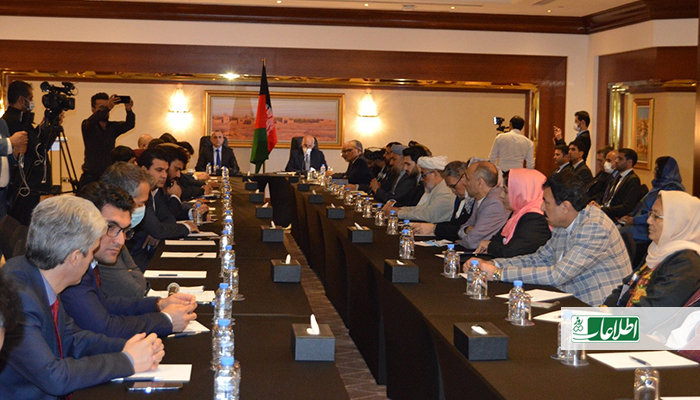President Ashraf Ghani arrived in Doha, Qatar, on Monday, October 05, to attend bilateral meetings with top Qatari leaders but he will not hold meeting with Taliban representatives in Doha even as peace talks are underway in the Qatar’s capital, Afghan officials told on Monday.
On the first day of his two day visit, Ghani met with Skeikh Khalid bin Khalifa bin Abdul Aziz Al Thani, the Prime Minister of Qatar. The two leaders discussed bilateral ties, mutual interest, enhancement of economic cooperation, and Afghan peace process, according to an Afghan official who was present on the occasion.
During his official visit, President Ashraf Ghani met the negotiating delegation of the Islamic Republic of Afghanistan. “I extend gratitude to you for your patience, principled approach and setting objectives in line with the Afghanistan Constitution, national interests and mandate of the Consultative Peace Jirga,” Ghani said as meeting members of the Afghan negotiating team.
Mohammad Masoom Stanekzai, head of the Afghan negotiating delegation, assured President Ghani that the delegation pursues the talks in line with the Constitution and national interests.
Peace stalemate
Ghani’s visit to Doha comes at a critical time as the negotiators of the Islamic Republic of Afghanistan and the Taliban negotiating team have become bogged down in setting principles for substantive negotiations.
Negotiations between the Afghan government and the Taliban started on September 12, aimed at bringing the warring parties to a mutual agreement on a ceasefire, and negotiate a possible power sharing settlement. A contact group of the two sides have met several times to set procedures and agenda for substantive negotiations but little progress has been made so far. A member of Afghan peace delegation told Kabul Now that the President might speak about truce at the end of his official visit.
A predominantly Sunni group, the Taliban, as some Afghan peace delegates say, are insisting on adherence to Hanafi jurisprudence as conflict resolution mechanism, but the government negotiators refuse Taliban condition, and say this could potentially pave path for the Taliban to discriminate against Shia population of the country and give a potential upper hand to the group to abrogate key provisions of the Afghanistan Constitution. Another contentious topic, which has caused hindrance ahead of a substantive negotiations, is how US-Taliban peace deal should be referred to, and how US-Taliban peace agreement should shape Afghanistan’s future.
Intensifying violence
On Monday, October 05, a suicide attack targeting convoy of Laghman governor killed at least eight people and wounded dozens, officials said.
Rahmatullah Yarmal, the governor for eastern Laghman province escaped unharmed but four of his bodyguards and four civilians were killed and 28 others wounded.
No group claimed responsibility for the attack.
On Saturday, October 03, a suicide bomber detonated a vehicle full of explosives at the entrance of a government facility in eastern Nangarhar province, killing 15 people, mostly civilians, officials said.
In response to intensifying suicide attacks, the Taliban, however, keep silent, claiming that they are not behind the attacks.
Future of peace talks
The future of Afghan peace appears to remain unclear as the Taliban representatives have stuck to their demands while the government delegation are insisting on a permanent ceasefire.
Former Afghan chief of intelligence, Rahmatullah Nabil, wrote on Twitter, “Ashraf Ghani will receive a decisive message from the US through Qatari officials in Doha this time, it is also expected that Ghani will receive a clear message from the US military & diplomats about the next steps. Seems the intra-Afghan dialogue was just a show.”
But Amrullah Saheh, the first vice president, who is accompanying President Ghani on his Qatar visit, told that the Afghan leaders were in Qatar to strengthen bilateral ties between the two countries, highlighting that they were not in Doha for breaking the current stalemate in peace. “We have not made the stalemate [therefore], we have not come here to break it. The Taliban tried to pester us but we will keep patience.”




